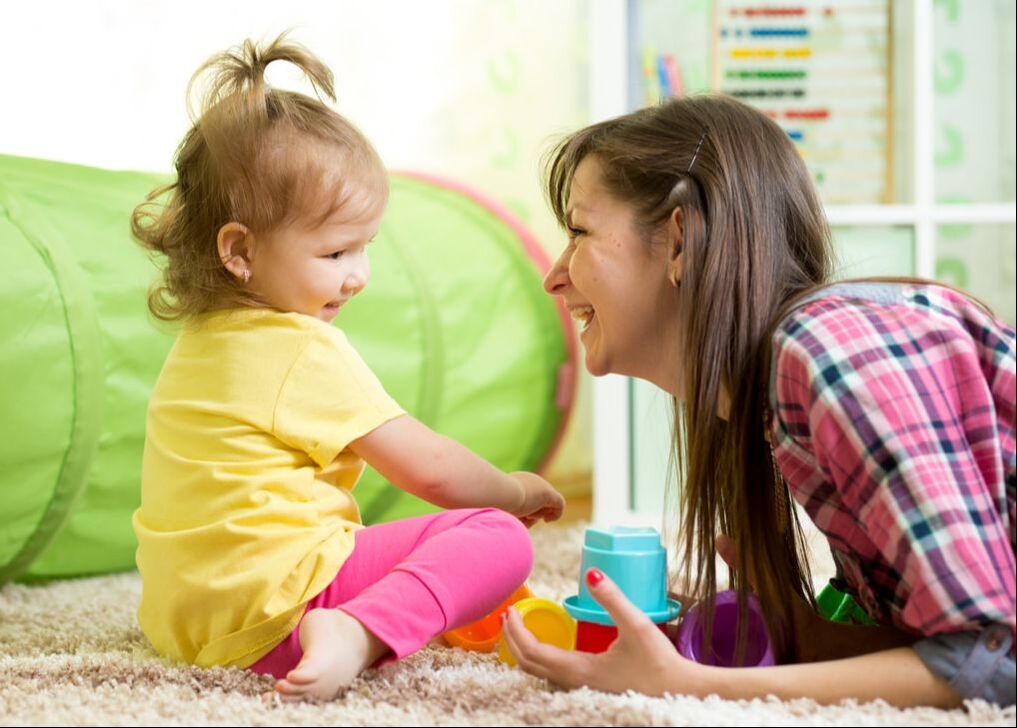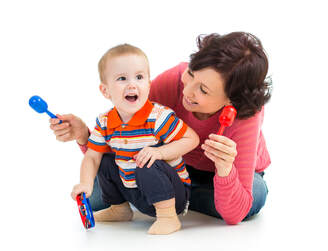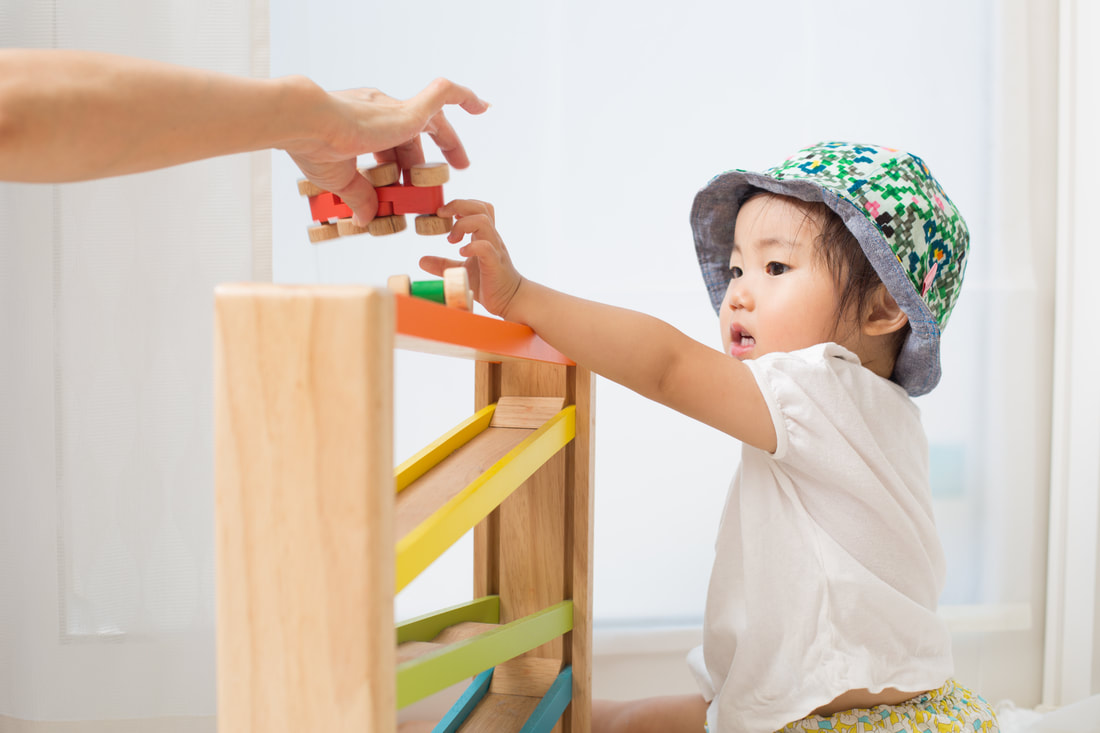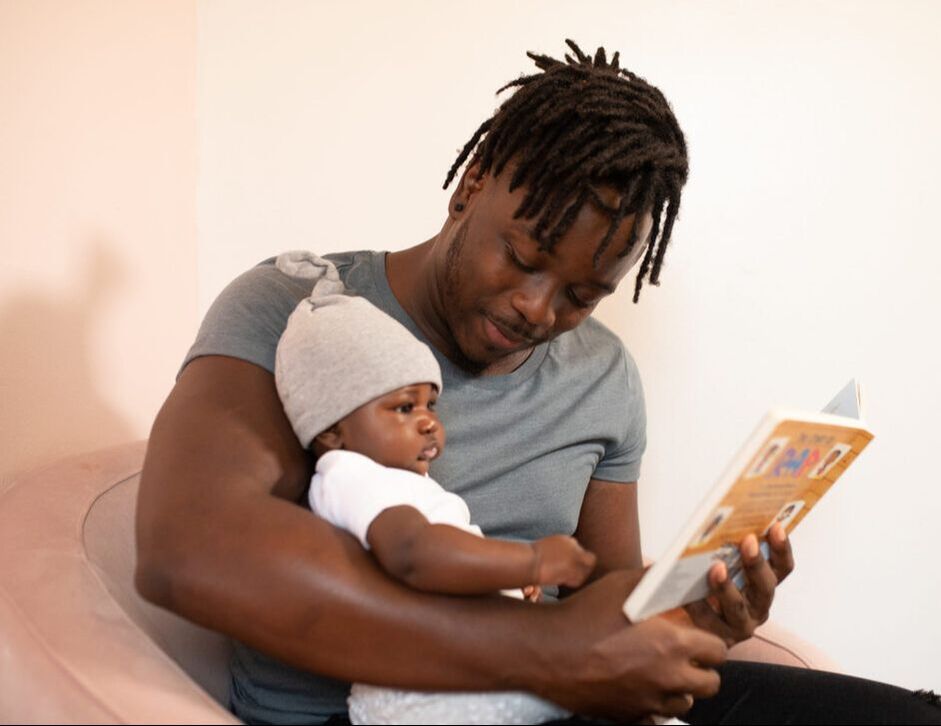Playing with infants and toddlers also helps them develop skills related to reading and writing. In the early years, the development of these skills is called emergent literacy. Young children learn literacy skills when we talk with them, read to them and play with them. The more often the better, and it's never too soon to start reading to babies! Young children also learn literacy from hearing language spoken around them and by being immersed in a print-rich and literacy-rich environment. This means they see lots of print around them and people using print often in their every day lives. Let them see you reading for information, writing shopping lists, and scheduling events on the calendar. Your children will want to learn these reading and writing skills, too. Five Practices That Foster Language and Literacy Development for Infant and Toddlers1. CONNECT! Building strong, responsive relationships with children sets a strong foundation for learning, behavior and health - for their lifetimes. It is the single most important factor in building resilience, the ability to bounce back after setbacks. The adult-child relationship is no less important in language and literacy development. When we express affection by smiling and snuggling, being playful, and really paying attention to our infants and toddlers, we are showing them that we love and care for them. Children learn best when they feel connected with us, and they are encouraged to communicate when they trust that we will be responsive to their efforts and meet their needs.
2. TALK AND SING! Talk directly to infants and toddlers as often as you can. Try to have as many conversations as you can, so all your interactions aren't just giving directions or correcting children. Be sure to use the children's names during these conversations, too. If you are talking about something around you, point to it so children can make the connection between the object and the words you are saying. Respond when children point to things, too. Label the object and talk about it, letting children take turns in the conversation with looks, gestures or sounds. Tell young children stories and stretch conversations. You can expand on what toddlers say with the appropriate language, without correcting them. "I goed fast!" "Yes, you went very fast." Talk to your children about many different events and ideas Describe what you are doing and thinking as you go about your day. Narrate the children's experiences, too. Give them encouragement by noticing their efforts. Becky Bailey, founder of Conscious Discipline®, has a simple script: "You ___ so [or when] ___. That was ___." For example, "You hugged your friend when she was sad. That was kind." Tell lots of stories. Toddlers especially love hearing stories about themselves. You can make up stories about everyday experiences or retell the story in a favorite book. You could even say a nursery rhyme in the form of a story instead of chanting or singing it, as my friend recently did for a toddler she just met: "Do you know the story of the itsy-bitsy spider? The itsy-bitsy spider climbed up a water spout. Then it rained and the rain knocked the spider down. The sun came up, and the spout dried out in the sun. Then you know what the spider did? It climbed up the water spout again." Playful Activity Ideas for Talking:
Singing also gets children's attention and helps them remember what's in the song. Connect the words to movement for an even more memorable experience. Playful Activity Ideas for Singing:
3. DO MATH! Math for infants and toddlers? Oh, yes! Before one year, infants are learning the concepts of “more” and “enough”. They learn to judge short distances and that there is an order of events in their day. These are early math concepts. Toddlers learn to count small numbers of objects, to match shapes, to compare objects and to follow simple patterns. When we play with infants and toddlers to build their language and literacy we can also help them learn math.
4. GET ACTIVE AND MOVE! In the infant and toddler years, play is often a full-body experience! Children are learning through their senses and their muscles as they play. Join in, exploring movement with your children: Crawl, run, jump, dance, and move with your children. Of course, active play has many benefits for physical health and development and stimulates children's ability to think. To boost children's language and literacy development as well, you can encourage them to act out action words, stories, songs and more. Better yet, do it with them! Even if our adult bodies no longer move quite as freely as children's, when w participate in active play we can share in the joy and reap the benefit of movement while encouraging language development at the same time.
5. READ, READ, READ! Reading together with infants and toddlers is the single most effective way to help them become proficient readers later. Reading helps children develop their vocabularies as they are introduced to words that they may not hear in everyday conversation. It helps them to understand language and increases their general knowledge of the world. Make reading a cozy and comfortable time for connecting with your children. Snuggle up! Talk about what you read with children. Involve them in the books, pointing to pictures and words and asking questions that get them to think. Let them decide when to turn the page and when story time is over. It's more important to talk about the book that to read all the words.
Try a new way to build language and literacy skills for infants and toddlers as you play together. Connect, talk, sing, point, count, move, and read. Your children will benefit in many ways, and you will, too! ResourcesBailey, B. A. (2000). I love you rituals. New York: HarperCollins Publishers, Inc.
Center on the Developing Child, Harvard University. (n.d.) Brain architecture. https://developingchild.harvard.edu/resources/serve-return-interaction-shapes-brain-circuitry/ https://developingchild.harvard.edu/resources/5-steps-for-brain-building-serve-and-return/) Greenberg, J. 2012. More, all gone, empty, full: Math talk every day in every way. Young Children 67 (3): 62-64. Kent District Library https://kdl.org/young-children/ https://kdl.org/young-children/ready-to-read/success-basics/ Leiderman, R. C. & Sami, W. S. (2012), Let’s play and learn together: Fill your baby’s day with creative activities that are fun and enhance development. Beverly, MA: Four Winds Press. Schickedanz, J. (2013). So much more than the ABCs: The early stages of reading and writing. Washington, DC: NAEYC. Torbert, M. (2005). Using active group games to develop basic life skills. Young Children 60 (4), p. 73-75. Torbert, M. & Schneider, L.B. (1993). Follow me too: A handbook of movement activities for three- to five-year-olds. Washington, DC: NAEYC. Wiggles, Tickles & Rhymes. (n.d.) Pierce County Library. https://www.piercecountylibrary.org/files/library/wigglesticklesall.pdf Zero to Three http://www.zerotothree.org/child-development/early-language-literacy/earlyliteracy2pagehandout.pdf www.zerotothree.org/resources/1514-beyond-twinkle-twinkle-using-music-with-infants-and-toddlers
0 Comments
Your comment will be posted after it is approved.
Leave a Reply. |
AuthorI'm Diane Goyette, a Child Development Specialist, Trainer, Consultant and Keynote Speaker. I'm excited to share my blog! Archives
August 2023
Categories
All
|
|
Ways to Contact Us:
Schedule an Appointment |
|
Follow earlychildhoodspecialties for encouragement, teaching tips and more!
|
Follow eepworm for child-friendly posts!
|
© 2013-2024 Early Childhood Specialties LLC. All rights reserved.







 RSS Feed
RSS Feed